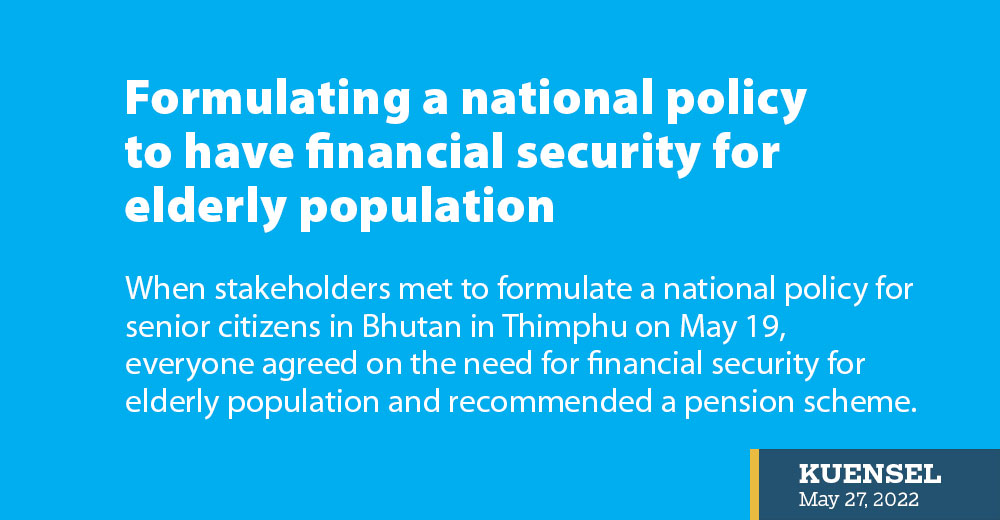Yangyel Lhaden
When stakeholders met to formulate a national policy for senior citizens in Bhutan in Thimphu on May 19, everyone agreed on the need for financial security for elderly population and recommended a pension scheme.
The stakeholders included representatives from Zhung Dratshang, armed forces, non-government organisations, civil society organisations (CSO), the Office of the Attorney General, and representatives from senior citizens.
They recommended a pension scheme to benefit the larger population, deducting certain percentage from employees’ salary and financial institutions to contribute to social protection of older people, and universal basic income.
Few available studies from National Statistics Bureau (NSB) 2017 shows that senior citizens face financial problems, food insufficiency, landlessness, debt burden, abandonment, disrespect, discrimination, and social exclusion in some aspects.
According to NSB report 2017, 63 percent of elderly population have financial problems, 15 percent are debt-ridden, 22 percent do not own land, 30 percent live in a poor shelter, and 26 percent of them face food insufficiency.
National Pension and Provident Fund (NPPF) has 65,890 members, which is only about eight percent of the total population in the country.
NPPF scheme is targeted only for civil servants, employees of government-owned and joint sector corporations, members of armed forces, employees of Build Bhutan Project and private sectors.
Leytshog drungchen with Zhung Dratshang, Ugen Namgyal, said that pension schemes did not cover the vulnerable population and benefitted only those who were employed. “There are many people who are not covered under the NPPF schemes.”
He is working on a proposal to include about 7,000 monks and nuns under Zhung Dratshang under the pension scheme.
Ugen Namgyal said that his proposal included bulk investment of fund because monks and nuns would not be able to pay monthly. “If my proposal is through it will help additional pension coverage of around 1.25 percent and provide old age income security to nuns and monks.”
A retired civil servant, Sonam Tshewang, said that for continuous flow of money to support old people, the policy should regulate financial institutions to contribute even at least 0.01 percent of their revenue to build reserve for financial protection. “NPPF could also look for a scheme for people who can make a monthly deposit of about Nu 500 or Nu 1,000.”
An official from NPPF said that they are exploring schemes, which would benefit the larger population but lack of data to study whether it would be feasible to include other groups and schemes such as making monthly deposit of Nu 500 was limited.
“NPPF and Royal Insurance Corporation of Bhutan Limited (RICBL) are at great risk with huge return and limited revenue for which we have to carefully study to make new schemes so that we don’t run into loss,” he said.
NPPF has 0.51 percent non-performing loan with a fund size of Nu 48,488.92 million (M) and total revenue of Nu 3,001.96M. There are 8,264 pensioners.
The NPPF official said that NPPF, in partnership with RICBL, initiated Lotedh Scheme since 2005 as a corporate social responsibility to provide Nu 100,000 for funeral rites to members and their families.
“Members invest Nu 270 monthly and if we calculate it will take 30 years for NPPF to make Nu 100,000. The question is will we ever get back Nu 100,000 with monthly investment?” he questioned.
The head of the United Nations Population Fund, Phuntsho Wangyel, said that there was little NPPF and RICBL could do to provide pensions to all people because they have to think of making profit and sustainability. “NPPF can only help and look for other schemes if there is a directive from the policy and government.”
The NPPF official said that they recommend a policy consideration for elderly citizens with universal coverage where most people are benefitted. “There should be adequate and comprehensive range of benefit with sustainably financed system.”
He said that provision should be right based and inclusive and adaptation to development in the world of work should be considered for pension for elderly citizens in the policy.
Meanwhile, Gross National Happiness Commission Secretariat is going to hold a series of policy formulation workshops and focus group discussions and presentations to different sectors before the launch of National Policy for the Senior Citizens in October.


